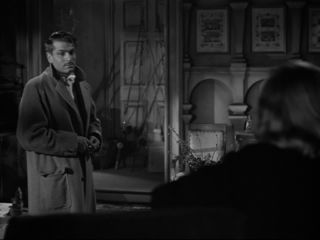The MacGuffin: News and Comment (28/Jul/2012)
(c) Ken Mogg (2012)
July 28
In the frame-capture above (entry for July 21), from Rebecca's superb boathouse scene, note that Maxim is smoking a cigarette. It goes with the territory. A close-up will show us an ashtray full of cigarette stubs at the exact moment Maxim refers to the sordid goings-on that occurred when Rebecca and Favell used to come to the boathouse. But we know that Maxim has avoided the boathouse since Rebecca's death - so in all likelihood those stubs are the actual ones left by Rebecca and Favell. They help evoke the sordid reality of that time. (The fact that Maxim has come to the boathouse now, on the night that Rebecca's boat has been found, indicates he knows that he must finally face what happened when Rebecca died.) As the camera pans around the boathouse, it also takes in an empty birdcage, signifying happier times (cf a similar shot in Sabotage), and other, cobweb-covered objects, confirming that the boathouse has been largely unvisited since Rebecca's death. (The ashtray filled with cigarette stubs is also a subtle echo of Mrs Van Hopper's unpleasant way of disposing of a spent cigarette - grinding it out in a jar of cold-cream! As already noted, Rebecca has a complex but meaningful tapestry, down to even the smallest details.) Maxim is never more sympathetic than in the boathouse scene, it seems to me. But we were looking at Robin Wood's 2001 article on Rebecca. There, Wood suggests that we feel antagonism towards Maxim - but I don't see it. Wood and the feminist author 'Bidisha' both construct anti-patriarchal arguments about Rebecca that may be largely in their own minds. Certainly, in Daphne du Maurier's novel, Maxim is a murderer, having been maliciously goaded by Rebecca after she has learned that she is already dying (of cancer). For censorship reasons, the film had to change that, and Rebecca now has died after falling and hitting her head on a piece of ship's tackle. So Rebecca's death, the film tells us, was 'an accident'. Wood suggests (fifth paragraph of his article) that this 'creates a serious problem for the viewer' - but again I'm not so sure. In watching the film again lately - and guided by what our 'advanced' Hitchcock discussion group seemed to think - I was impressed by how well the screenplay, and Hitchcock's direction, work to keep us both sympathetic to Maxim and convinced that he is telling the truth. (Wood himself allows that the film does not support an hypothesis that Maxim is lying - although note that the film has dwelt more than once on Maxim's 'temper', as Favell refers to it.) I told our group: 'I don't see a problem here. At first thought, we might suppose that good, upright Maxim [he of the noblesse oblige mentioned on July 14, above] would not have panicked, as he says he did [and that therefore this is a weakness of the screenplay]. But the screenplay has carefully established how Rebecca's licentious behaviour with Favell - and the fraudulence of the marriage itself - have long been eating away at Maxim. [On this, see also last week's entry.] So when Rebecca in the boathouse taunts Maxim ... he would have been less than human not to entertain murderous thoughts at that moment. This is roughly the equivalent [I went on] of the Oedipal flashback in Spellbound (1945). There, Ballyntine has not actually been responsible for his brother's death on a sharp spike, but he may well - such is the nature of sibling rivalry during the Oedipal phase at about age 4 or 5 (when Freud said that thoughts of rivalry are very fierce) - have assumed guilt for what had happened. ... In short, Maxim at the time of Rebecca's death "went mad" for a bit [cf July 7, above], and may understandably have felt himself to be her actual murderer. Hence [I concluded] his panicked behaviour immediately afterwards. I don't have a problem with this, in terms of the film's narrative.' Right, that's about it. And yet, having written all of the above on the film's 'obvious' nature, I can't forget that I, too, have often argued (like Wood and 'Bidisha') that the 'real' narrative of Rebecca, inherited from Du Maurier's novel (and deepest intentions), is secretly sympathetic to Rebecca! It wouldn't be the only time, I told our group, that a Hitchcock film can imply two opposing meanings at once! Interestingly, in writing about the world of espionage ('The New Yorker', May 10, 2010), Malcolm Gladwell had occasion to cite the famous New Criticism (circa 1920-1950) which, someone observed, was propelled not just by the idea of 'close reading' but by 'the discovery that it is possible and proper for a poet to mean two differing or even opposing things at the same time'. QED?
This material is copyright of Ken Mogg and the Hitchcock Scholars/'MacGuffin' website (home page) and is archived with the permission of the copyright holder. |

